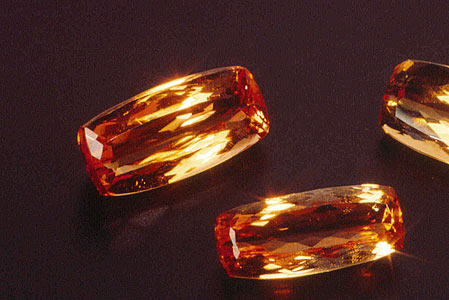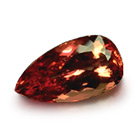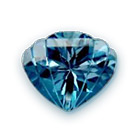Topaz is a clear gemstone found in many colors and prized throughout the world for its hardness, clarity, beauty, and ability to provide strength, protection, and vision.

Topaz is normally found in hues of yellow or blue, but the birthstone of November is found in nature in many different colors, from pinkish-orange to colorless. Once valued in Ancient Rome and Egypt for its color of the setting sun, topaz is found among the Portuguese crown jewels and world-famous collections and inspired the name of a Hitchcock spy thriller in 1969.
Yellow, Blue or Colorless Topaz
Topaz is a fluorine aluminum silicate crystal and, when completely pure, is clear and colorless. In nature, though, topaz occurs in several colors. The most commonly occurring natural topaz is clear, pale yellow, grey, orange, rose, or red. The name is derived from either the Sanskrit word “tapas,” fire, or the Greek “topazos,” which means green gemstone.
 Clear, grey, or pale yellow topaz can be heat treated and irradiated to produce the rare blue topaz or coated with a thin film to give a surface rainbow effect. Pinkish-orange to red-orange “imperial topaz” is the most valuable variety.
Clear, grey, or pale yellow topaz can be heat treated and irradiated to produce the rare blue topaz or coated with a thin film to give a surface rainbow effect. Pinkish-orange to red-orange “imperial topaz” is the most valuable variety.
Yellow topaz is often confused with less valuable citrine, and citrine is sometimes even marketed as “gold topaz,” “Madeira topaz” or “Spanish topaz.” Blue topaz is sometimes confused with aquamarine. Topaz is heavy and very hard, rating a hardness of 8 on the Mohs scale.
Topaz in Myth and History
The ancient Egyptians believed that topaz was colored golden by the touch of the sun god, Ra, and they used topaz in protective amulets and jewelry. The Romans connected topaz with Jupiter, also a god of the sun. The ancient Greeks believed that the topaz had mystical powers to protect a wearer from harm, make him or her invisible when needed, and to restore sight, both physical and metaphorical.
 Although a stone translated as topaz is mentioned in the Bible, this was probably chrysolite or yellow peridot. This “topaz” is one of the twelve stones used in the gates of New Jerusalem.
Although a stone translated as topaz is mentioned in the Bible, this was probably chrysolite or yellow peridot. This “topaz” is one of the twelve stones used in the gates of New Jerusalem.
The Portuguese crown bears a famous topaz that was originally mistaken for a diamond. When pink topaz was first found in Russia, it was controlled exclusively by the Tsar, and only those to whom he gave the stones were allowed to wear them, engendering the name “imperial topaz” for the most valued, pink to reddish-orange topaz.
Yellow and orange topaz has often been confused with citrine, leading to the stone’s fall in stature over the past several decades.
Magical Significance and Powers of the Topaz
Like most gemstones, topaz has been attributed with a long list of healing and magical powers. Topaz is said to:
- provide strength
- be cooling and appeasing
- warn of poison
- release tension and balance the emotions
- stimulate the endocrine system
- bring joy and rejuvenate the spirit
- dispel enchantment and improve eyesight
- cure insomnia
- relieve asthma and allergies
Topaz Gemstone in Jewelry
Topaz of all colors offers beautiful versatility in rings, pendants, earrings, bracelets and other jewelry. Yellow topaz (often called orange topaz) is one of the birthstones for the month of November alongside its lookalike, citrine. Blue topaz is frequently listed as a birthstone for December, although it is not on the official birthstone lists.
Orange topaz is the state gemstone of Utah, while Texas lays claim to the rare blue topaz. Any color of topaz is traditional in gifts for the 4th wedding anniversary, but the 23rd-anniversary gemstone is specifically imperial topaz.
Topaz is found in Brazil, Sri Lanka, Russia, the United States, China, Japan, Pakistan, Siberia, Myanmar, Nigeria, Australia, Mexico, and elsewhere throughout the world.
Reference
- All That Gifts, “Gemstones: Topaz,” All-That-Gifts.com, 2005.
- Eurogem, “Topaz – Stunning Gemstone of the Setting Sun,” Eurogem.biz, 2009.
- International Colored Gemstone Association, “Topaz,” Gemstone.org, 2009.
